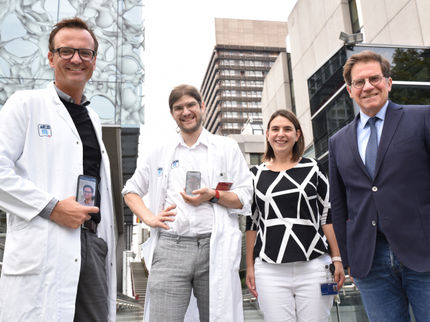Therapy Optimisation by Analysing the Genome
The University Hospital Bonn plans to have a stronger focus on pharmacogenetics – thus emphasising the influence of genetic characteristics on the effect of medications. This idea embodies the approach for personalised medicine. To integrate extensive pharmacogenetic analysis into the clinical workflow, the Institute of Human Genetics at the University Hospital Bonn and HMG Systems Engineering GmbH (HMG) are establishing a partnership. The intended purpose is to provide the treating physician with clinically relevant information regarding pharmacologic and genetic interaction risks. That way, physicians are empowered to optimize the individual drug therapy for each patient.

In the lab: Prof. Dr. Markus Nöthen, Director of the Institute of Human Genetics at the University Hospital Bonn.
© Volker Lannert / Uni Bonn
Each human metabolises medication differently. Similar to the diverse factors forming diseases, the influences on the effect and tolerance of the prescribed medicine tend to be multifaceted. In addition to the age, weight, lifestyle and nutrition habits, and the intake of further medicines, patients’ genetic characteristics also impact the desired therapeutic effect. In consideration of selected characteristics in the genome, pharmacogenetics enables an individual optimisation of the medication. Thus, patient-related risks and side effects can be reduced.
"The development of personalised therapies is making great progress."
"The pharmacogenetic profile of a patient can be critical in determining an optimal medication. Especially when several drugs are prescribed and interactions between them are to be expected," says Prof. Dr. Markus Nöthen, director of the Institute for Human Genetics at the University Hospital Bonn. With its scientific working groups, it contributes to the research of the genetic causes of diseases and to the development of effective, individually tailored drug therapies and preventive measures.
“The partnership will enable us to use the innovative software and database developed by HMG and to introduce high-level pharmacogenetic diagnostics. In addition, a pilot project for patients at the University Hospital Bonn will be developed in the coming months. It is our vision that patients at our clinic benefit from the latest scientific knowledge in genetic medicine," says Prof. Nöthen.
“The future of medical technology is personalised medicine”
HMG has developed an IT platform, which interprets clinically relevant genetic information of the patient and its influences on individual drug metabolism. The software consists of own pharmacogenetic database. Considering 173 genetic variations, it constitutes the current state of research and is based upon up-to-date findings of science. The database is complemented by a drug interactions check, evaluating the interactions of 40,000 drugs and 60 food and beverages. This enables physicians to optimise the patient’s medication in an even more precise, safe and efficient way.
“We are convinced that this medical technology will prospectively provide the appropriate drug with the right dose at the right time for each patient. We are delighted to partner with the renowned Institute of Human Genetics at the University Hospital Bonn and Prof. Markus Nöthen. Together we are taking a major step to translate pharmacogenetics basic research to clinical routine and medical prescription,” says Herna Muñoz-Galeano, founder and managing director of HMG Systems Engineering GmbH.


















































